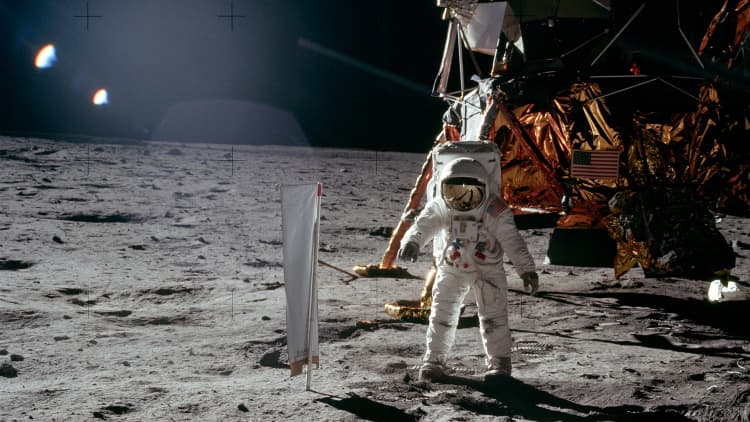
A view from onboard the upper stage of rocket LV0009 during the company’s livestream on March 15, 2022.
Astra / NASASpaceflight
The space sector’s on the tail end of a boom-and-bust cycle. While many companies battened down the hatches to survive, a few publicly-traded names are running on fumes.
A flurry of about a dozen space companies went public over the last few years. Although each have had fairly dismal stock performances since their debuts, the majority are still moving forward and look to build momentum in the year ahead, with some closing in on coveted profitability milestones.
But a trio of names appear likely to go the way of Virgin Orbit, which flamed out last year. Here’s who’s most at risk of delisting, acquisition or even bankruptcy.
Sign up here to receive weekly editions of CNBC’s Investing in Space newsletter.
Momentus
Space tug operator Momentus has already warned shareholders that it’s running out of money, and earlier this month the company abandoned plans for its next mission.
Once valued at over $1 billion, Momentus has gone through a tumultuous couple of years. Despite a 1-for-50 stock split last year, its shares currently trade near 80 cents, putting the company at a depressed $7 million valuation.
The next few weeks will likely prove crucial for Momentus to find a major new backer or buyer, or else face bankruptcy.
Astra
Astra has been conducting piece-meal financing rounds from a handful of investors over the past couple months, as the company’s been nearly out of cash since October.
Its rocket-launching business has been on hiatus since June 2022, and its acquired spacecraft business is not driving meaningful revenue growth. And, while the company’s founders floated a take-private plan in November, there’s been no word from Astra’s board of directors on the proposal.
Once valued at over $2.5 billion, Astra’s valuation has been under $50 million for months.
Short of completing that take-private deal, it’s unclear how the company could climb out of its cash-desperate situation.
Sidus
Sidus Space is a little-known space company that went the traditional IPO route in late 2021 and began trading on the Nasdaq at a near $200 million valuation. Sidus has aimed to build its own satellite constellation as a testing or data platform for a variety of customers.
But it’s seen minimal revenue growth and rising annual net losses. While its inaugural satellite was supposed to launch in late 2022, the company has yet to get the spacecraft in orbit, most recently targeting a March launch.
Sidus has raised small amounts of funding through public stock offerings of $5 million or less since its IPO. But it had less than $2 million in cash at the end of September, trading at a near $9 million valuation according to FactSet.
Last month, Sidus performed a 1-for-100 reverse stock split to regain compliance with Nasdaq listing rules.
Momentus, Astra and Sidus did not respond to CNBC requests for comment.
Elsewhere in space
A fourth space company in a potentially precarious spot is satellite imagery company Satellogic. Its most recent financial update only dates to the end of June. At the time, Satellogic disclosed it had substantial doubt of surviving through September 2024. The company’s stock currently trades near $1.50, at a $21 million valuation.
Despite some likely turbulence ahead, the space sector as a whole isn’t necessarily struggling and continues to attract interest from the private markets. Overall, investment in the space sector bounced back in 2023, with companies bringing in $12.5 billion in investment last year.
And while industry analysts predicted a fallout from the flurry of public debuts a couple years back, it hasn’t been as severe as forecast just yet. Many space stocks are below where they were when they came to market — and in many cases well behind original financial forecasts — but most are not on death’s door.
For example, Terran Orbital won’t be near the $411 million in 2023 revenue it forecast when it was going public three years ago. But, despite its stock price trading near 80 cents at a $156 million valuation, Terran Orbital appears to have a lifeline from a key customer.
Earlier this month, Terran announced receipt of a milestone payment from its biggest customer, Rivada, and, on the same day, said its cash at year-end was $70 million, up from $39 million at the end of the third quarter.
